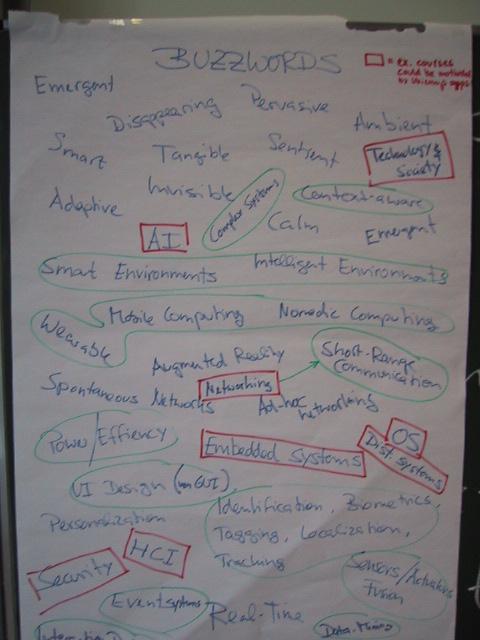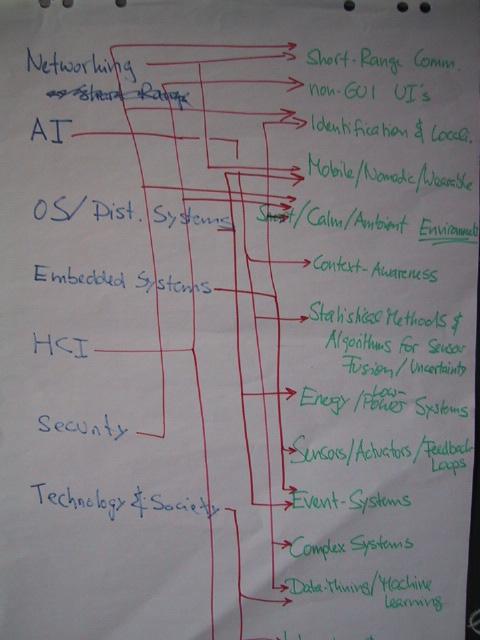|
 ETH Zurich :
Computer Science :
Pervasive Computing :
Distributed Systems :
Research :
Events :
Dagstuhl Ubicomp ETH Zurich :
Computer Science :
Pervasive Computing :
Distributed Systems :
Research :
Events :
Dagstuhl Ubicomp
Dagstuhl Ubicomp - Breakout Session
Ubiquitous Computing Curriculum
Chair: Marc Langheinrich
The group was chartered with exploring the contents of a comprehensive
ubiquitous computing curriculum at the Graduate level.
 |
We started out by collection buzzwords surrounding the topic of ubiquitous
computing. At first, this would include the various alternative descriptions
that are used for this field today, e.g., Emergent, Disappearing,
Pervasive, Ambient, Smart, Tangible, Sentient, or Adaptive
Computing. These words can be found on the upper half of the picture on
the left (click on the image for a larger image).
We then began to collect more specialized topics and subtopics often
associated with ubiquitous computing, such as Smart Environments, Nomadic
Computing, or Non-GUI UI Design. Some of these topics were
already well-established computer sciences courses, such as AI,
Networking, or Embedded Systems. We boxed these basic courses
that somehow intersect the field of ubiquitous computing with red boxes (see
picture on the left). More specialized topics were then circled with green,
identifying specialization topics that often built upon concepts taught in
basic courses.
We started to draw lines between such specialized courses and their
corresponding basic class, but decided to re-assemble these topics on a second
sheet in order to make dependencies clearer (see below).
|
| Figure 1: Buzzwords surrounding Ubicomp |
|
On the right you can see the two levels of classes that could form a dedicated
ubiquitous computing curriculum. The left half of the picture shows basic level
courses (in blue) that often already exist today as part of a general computer
science curriculum: Networking, AI, OS/Distributed Systems (these
could be a single class but are also often taught seperately), Embedded
Systems, Human-Computer Interaction, Security, and Technology &
Society. All of these classes are related to some aspects of ubiquitous
computing and could, if part of a dedicated curriculum, feature a number of
example applications in the ubicomp field for motivation.
From each of the basic level classes, a number of specialized classes would
then explore more specific details of ubiquitous computing. While more or less
all of the basic classes should probably be required in a ubiquitous computing
curriculum, only a restricted subset of specialized classes seems feasible.
While the group identified a comprehensive list of such specializations, we
were not able to group subsets into meaningful specialized subfields (due to
time constraints). The identified classes include: Short-Range
Communications, non-GUI User Interfaces, Identification & Localization,
Mobile-Nomadic-Wearable Computing, Smart-Calm-Ambient Environments,
Context-Awareness, Statistical Methods & Algorithms for Sensor Fusion
(Uncertainty), Energy Issues in Low Power Systems, Sensors-Actuators-Feedback
Loops, Event-Systems, Complex Systems, Data Mining and Machine Learning,
and Interaction Design (the last one is missing on the picture).
One thing the group was unable to come up with was a condensed version of these
topics for a 1-2 semester ubicomp lecture. Perhaps a (rather small) subset of
the specification classes could provide some guidance as to the topic
selection, though given the large number of possibly relevant issues, the group
felt that a rather narrow selection of the material would need to be made for
such a short course.
|
 |
| Figure 2: Possible Base-level and Specialization Courses |
See also the slides assembled by Thomas
Ziegert during this session.
Participants
Gaetano Boriello, Clemens Cap, Friedemann Mattern, Marc Langheinrich, Peter
Lungstrand, Andreas Zeidler, Thomas Ziegert
Back
|

